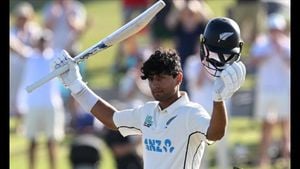Pablo Longoria, the president of Olympique de Marseille (OM), recently found himself at the center of controversy after making inflammatory remarks following his team's 3-0 defeat to Auxerre on February 23, 2025. Initially, Longoria accused French referees of "true corruption," sparking outrage within the football community. Just two days later, he issued apologies, admitting to his misstep.
After the match against Auxerre, Longoria appeared visibly upset and vocalized his frustration, stating, "La Ligue 1 est un championnat de merde" (Ligue 1 is a crap league). He suggested his club would leave Ligue 1 immediately if the Super League were to approach them.
On February 24, during an interview with AFP, Longoria sought to retract his earlier statements, firmly stating, "Je tiens à dire qu’il n’y a pas de corruption dans le foot français" (I want to say there is no corruption in French football). He reflected on his angry outburst, acknowledging, "La forme n’était pas appropriée et ce mot, je le regrette" (The form was not appropriate and I regret using this word). This public acknowledgment of regret came amid growing speculation about potential sanctions against him for his initial comments.
Longoria's initial accusation drew sharp reactions from the refereeing community, prompting the referees of Ligue 1 to announce intentions to file defamation complaints against the OM president. Their dissatisfaction with his comments was palpable, asserting they were "unacceptable" and detrimental to the credibility of refereeing.
Reflecting on his conduct, Longoria stated, "Un président de club ne peut pas se comporter comme ça. Rien ne justifie la forme et je ne suis pas content de moi-même" (A club president cannot behave like this. Nothing justifies the form, and I am not happy with myself). He emphasized the pressures of defending his club, citing, "Il y a eu cette saison beaucoup de décisions arbitrales sur lesquelles je considère que l’OM a été défavorisé" (There have been many refereeing decisions this season on which I believe OM has been disadvantaged).
Despite recanting his comments about corruption, Longoria did not shy away from addressing what he sees as systemic issues within French officiation. He remarked, "Il faut améliorer beaucoup de choses pour éviter la confusion" (We need to improve many things to avoid confusion). This sentiment highlights his commitment to advocacy for his club and his desire for higher standards within the league's officiation.
The incident highlights the increasingly contentious atmosphere surrounding Ligue 1. Officials, clubs, and supporters are left to ponder the implications of Longoria’s remarks and the overarching narrative of officiation within French football. While Longoria's apology may have quelled immediate concerns, the underlying issues he raised remain at the forefront of public discourse. The fallout from this event emphasizes the delicate balance club officials must maintain when voicing frustrations; the sport thrives on passion, but unchecked emotions can lead to severe reputational and legal repercussions.
Longoria's case serves as a reminder of the high stakes involved as clubs navigate the pressures of competitive sports, where every decision, on and off the field, holds weight. With his club’s reputation and the integrity of French football at stake, the road to resolution may require not only personal regrets but also institutional reforms. How this situation will evolve and whether improvements will manifest remain to be seen, but one thing is clear: Longoria intends to keep pressing for changes he believes are necessary to level the playing field for all clubs within the league.



